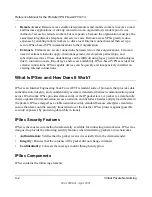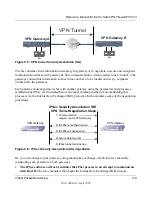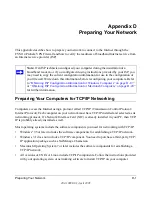
Reference Manual for the ProSafe VPN Firewall FVS114
Virtual Private Networking
C-3
202-10098-01, April 2005
•
Encapsulating Security Payload (ESP)
: Provides confidentiality, authentication, and
integrity.
•
Authentication Header (AH)
: Provides authentication and integrity.
•
Internet Key Exchange (IKE)
: Provides key management and Security Association (SA)
management.
Encapsulating Security Payload (ESP)
ESP provides authentication, integrity, and confidentiality, which protect against data tampering
and, most importantly, provide message content protection.
IPSec provides an open framework for implementing industry standard algorithms, such as SHA
and MD5. The algorithms that IPSec uses produce a unique and unforgeable identifier for each
packet, which is a data equivalent of a fingerprint. This fingerprint allows the device to determine
if a packet has been tampered with. Furthermore, packets that are not authenticated are discarded
and not delivered to the intended receiver.
ESP also provides all encryption services in IPSec. Encryption translates a readable message into
an unreadable format to hide the message content. The opposite process, called decryption,
translates the message content from an unreadable format to a readable message. Encryption and
decryption allows only the sender and the authorized receiver to read the data. In addition, ESP has
an option to perform authentication, called ESP authentication. Using ESP authentication, ESP
provides authentication and integrity for the payload and not for the IP header.
Figure C-1: Original packet and packet with IPSec Encapsulated Security Payload
Summary of Contents for FVS114NA
Page 4: ...202 10098 01 April 2005 iv...
Page 12: ...202 10098 01 April 2005 xii Contents...
Page 211: ...Reference Manual for the ProSafe VPN Firewall FVS114 Glossary 11 202 10098 01 April 2005...
Page 212: ...Reference Manual for the ProSafe VPN Firewall FVS114 12 Glossary 202 10098 01 April 2005...


































